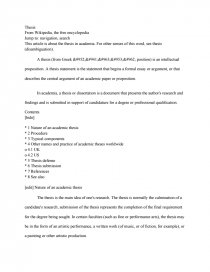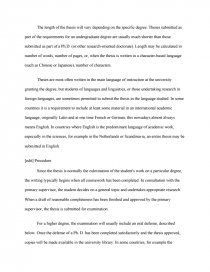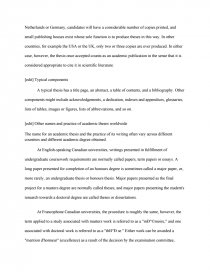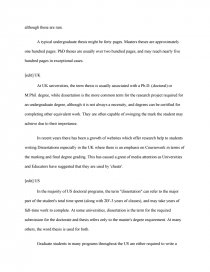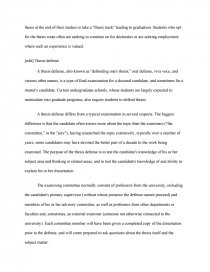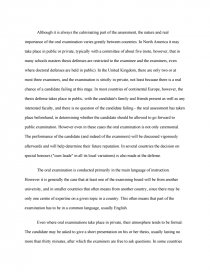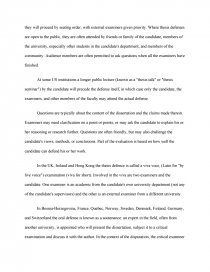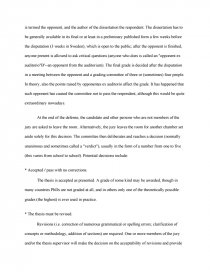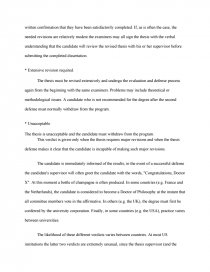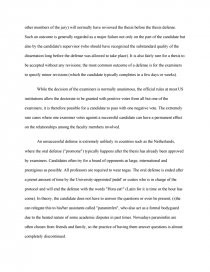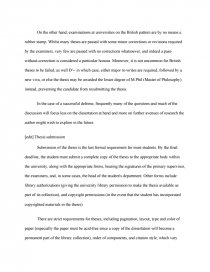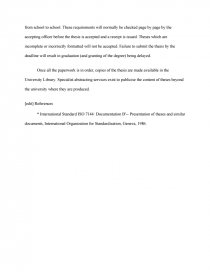Thesis
Essay by review • April 19, 2011 • Research Paper • 3,228 Words (13 Pages) • 1,341 Views
Thesis
From Wikipedia, the free encyclopedia
Jump to: navigation, search
This article is about the thesis in academia. For other senses of this word, see thesis (disambiguation).
A thesis (from Greek θέσις position) is an intellectual proposition. A thesis statement is the statement that begins a formal essay or argument, or that describes the central argument of an academic paper or proposition.
In academia, a thesis or dissertation is a document that presents the author's research and findings and is submitted in support of candidature for a degree or professional qualification.
Contents
[hide]
* 1 Nature of an academic thesis
* 2 Procedure
* 3 Typical components
* 4 Other names and practice of academic theses worldwide
o 4.1 UK
o 4.2 US
* 5 Thesis defense
* 6 Thesis submission
* 7 References
* 8 See also
[edit] Nature of an academic thesis
The thesis is the main idea of one's research. The thesis is normally the culmination of a candidate's research; submission of the thesis represents the completion of the final requirement for the degree being sought. In certain faculties (such as fine or performance arts), the thesis may be in the form of an artistic performance, a written work (of music, or of fiction, for example), or a painting or other artistic production.
The length of the thesis will vary depending on the specific degree. Theses submitted as part of the requirements for an undergraduate degree are usually much shorter than those submitted as part of a Ph.D. (or other research-oriented doctorate). Length may be calculated in number of words, number of pages, or, when the thesis is written in a character-based language (such as Chinese or Japanese), number of characters.
Theses are most often written in the main language of instruction at the university granting the degree, but students of languages and linguistics, or those undertaking research in foreign languages, are sometimes permitted to submit the thesis in the language studied. In some countries it is a requirement to include at least some material in an international academic language; originally Latin and at one time French or German, this nowadays almost always means English. In countries where English is the predominant language of academic work, especially in the sciences, for example in the Netherlands or Scandinavia, an entire thesis may be submitted in English.
[edit] Procedure
Since the thesis is normally the culmination of the student's work on a particular degree, the writing typically begins when all coursework has been completed. In consultation with the primary supervisor, the student decides on a general topic and undertakes appropriate research. When a draft of reasonable completeness has been finished and approved by the primary supervisor, the thesis is submitted for examination.
For a higher degree, the examination will usually include an oral defense, described below. Once the defense of a Ph. D. has been completed satisfactorily and the thesis approved, copies will be made available in the university library. In some countries, for example the Netherlands or Germany, candidates will have a considerable number of copies printed, and small publishing houses exist whose sole function is to produce theses in this way. In other countries, for example the USA or the UK, only two or three copies are ever produced. In either case, however, the thesis once accepted counts as an academic publication in the sense that it is considered appropriate to cite it in scientific literature.
[edit] Typical components
A typical thesis has a title page, an abstract, a table of contents, and a bibliography. Other components might include acknowledgements, a dedication, indexes and appendices, glossaries, lists of tables, images or figures, lists of abbreviations, and so on.
[edit] Other names and practice of academic theses worldwide
The name for an academic thesis and the practice of its writing often vary across different countries and different academic degree obtained.
At English-speaking Canadian universities, writings presented in fulfillment of undergraduate coursework requirements are normally called papers, term papers or essays. A long paper presented for completion of an honours degree is sometimes called a major paper, or, more rarely, an undergraduate thesis or honours thesis. Major papers presented as the final project for a masters degree are normally called theses; and major papers presenting the student's research towards a doctoral degree are called theses or dissertations.
At Francophone Canadian universities, the procedure is roughly the same, however, the term applied to a study associated with masters work is referred to as a "mÐ"©moire," and one associated with doctoral work is referred to as a "thÐ"Ðse." Either work can be awarded a "mention d'honneur" (excellence) as a result of the decision by the examination committee, although these are rare.
A typical undergraduate thesis might be forty pages. Masters theses are approximately one hundred pages. PhD theses are usually over two hundred pages, and may reach nearly five hundred pages in exceptional cases.
[edit] UK
At UK universities, the term thesis is usually associated with a Ph.D. (doctoral) or M.Phil. degree, while dissertation is the more common term for the research project required for an undergraduate degree, although it is not always a necessity, and degrees can be certified for completing other equivalent work. They are often capable of swinging the mark the student may achieve due to their importance.
In recent years there has been a growth of websites which offer research help to students writing Dissertations especially in the UK where there is an emphasis on Coursework in
...
...
